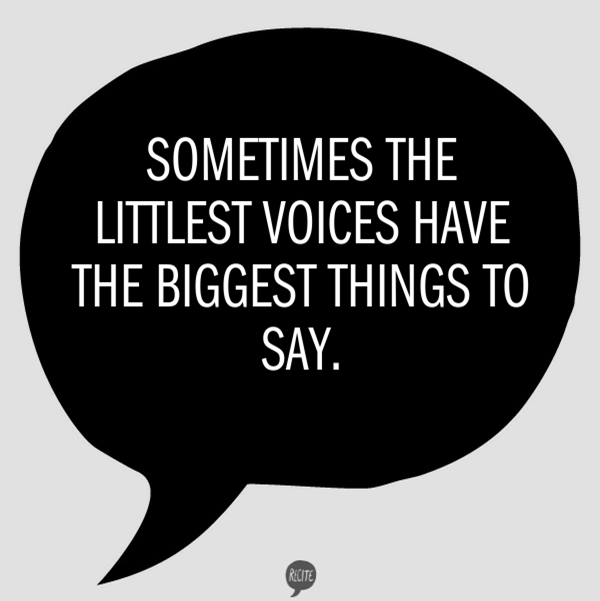As I was preparing my scholars for student-led conferences last week, I began to recall how anxious I felt when my parents went off to school for the traditional biannual parent-teacher conference. The anxiety I felt was not even rational: I was a pretty good student and I made honor roll each quarter. So why was my experience so disconcerting? Well, for one, I was sitting among “authority figures” that were discussing and assessing my day-to-day behavior, habits and academic struggles. I don’t recall anyone asking me how I felt about my learning and my learning style. After it was all said and done, we left the conference and mom gave me “the talk” when I got home. Since I made good grades, the conversation mainly focused on my struggles in math. As I moved up through the grade levels, my experience did not change all that much; I still felt invisible through much of the process.
When I decided to become a teacher, I knew I wanted my students’ experience with parent-teacher conferences to be different than my own. I am a huge advocate of student-led conferences. When I was practicing with my students last week, and they were going through their scripts, one of them wrote to his parents, “Thank you for supporting me. Thank you for listening to me when I get frustrated with my homework. You never get mad at me. You are the best.” The class overheard him and applauded. When I asked him how he thinks his parents will respond to his appreciation of them, he said his mom would probably cry and give him a hug. That nearly brought me to tears. Now you tell me how I can ever go back to the traditional parent-teacher conference after that tender moment with my student.
During this time of year, as many schools prepare for parent-teacher conferences, I believe they should consider involving the students in the process. It’s not a radical concept to involve kids in the process of discussing their academic progress; it is an approach that many schools use and it has been around for decades. Student-led conferences aren’t new. In an era where parents can instantly chat with their child’s teacher through Remind.com, or track their child’s grades and attendance on a Google app or Skyward, an online information system, the traditional parent-teacher conference has endured. But, increasingly, schools are looking for ways, such as student-led conferences, to revamp the old model.
My principal has given teachers an option to replace the old format of parent-teacher conferences with a more “student-centered learning” approach to conferencing and schooling. With this model, students are given more freedom to connect their individual interests to their academic learning and future goals. As teachers, we are considered facilitators, collaborators and coaches, and students are expected to shoulder more responsibility for their school lives—including organizing all the details for these yearly conferences with parents.
I absolutely love student-led conferences because I can use it to teach skills that my students cannot learn from a textbook: organization, long-term planning, confidence with public speaking, collaboration and self-reflection—even how to shake hands and make introductions in a more formal setting. This approach definitely aligns with my core teaching philosophy—to move beyond rote knowledge to develop the kind of critical-thinking skills needed for real world application and success.
However, I do acknowledge and recognize that one of the purposes of the teacher-led conferences is to honor the expertise of the teacher and solidify a healthy, bonding relationship between the parent and teacher. This ensures parents can understand and support their children academically, but I believe student-led conferences can have the same impact; I have witnessed it firsthand with my own students and their parents who chat with me briefly after each conference. I believe student-led conferences offer a better way for parents to learn how to support their students academically. Instead of having students stay home while their parents and teachers talk about them in the third person, why not have students lead the conference. While the specific logistics and dynamics of student-led conferences vary, the basic spirit is the same: This is the student’s moment to take responsibility for their own learning. My scholars and I prepare for the conference through a collaborative review of their previous work and a guided reflection on the connection between their efforts and the quality of their work.

Parent-teacher conferences are still a good idea in concept, but they reflect a tradition that may be too centered on adults. Flipping these conferences to be student-led empowers the student and facilitates a partnership between the teacher and parents that is focused on supporting what the student identifies as his/her strengths and challenges in learning, not what the teacher or parent identifies for the student.
The biggest argument or concern I have heard regarding student-led conferences is…drumroll please
With these formal meetings increasingly being led by the student, is that truly an improvement? How can the teacher be completely straightforward to a parent with a child present in the room without shattering the student’s self-esteem?
It’s a valid concern. What’s my response? If the child and teacher have collaboratively worked on the process together, and it was truly a joint venture, then what the child says and what the teacher says about that child is one in the same; it’s harmonious. There is no conflict of interest or dreams being shattered because both teacher and child have reached the same conclusion about that child’s strengths and weaknesses. In addition, if there truly is a very sensitive issue, topic or concern that the teacher or parent would like to discuss (without the child present), the teacher or parent could always have the student wait outside for a few minutes while the teacher speaks with the parent. It actually happened last week when one of my parents had their child step outside to discuss a very personal incident that happened to my student when she was just 10 years old; it was so heartbreaking.
All in all, I know there will always be some parents and teachers who may have a tough time with the idea of children leading a conference. I understand that some parents may not be able to wrap their mind around this concept. However, I do feel that the student-led conference is one way to help strengthen relationships between families and schools and is a possible solution to parents’ frustrations over lengthy waits to speak to teachers in the traditional parent-teacher format.
For this past conference, I wanted some quantitative data behind this age old debate: Traditional vs. Student Led. I wanted to know how my parents really felt about student-led conferences, so I created a parent questionnaire soliciting their feedback. So far, the response has been overwhelmingly positive and supportive of the students, the process and the format. No matter where you stand on this issue, one thing is for sure: “Learning is not attained by chance, it must be sought for with ardor and attended to with diligence.”— Abigail Adams











Comments 3
WHAT A LESSON! Preparing the little guys for conferences and engaging them in metacognitive dialogues? You’re a rockstar, dude. This has really inspired me to rethink my simple “grade checks” with Sophomores. Thanks, Treva.
Thank you for bringing a fresh perspective to this concept Treva. The quote from your student is exactly why a student centered approach is so key. I know I am still guilty of stealing time away from the student when I was in the classroom, but it was something I worked on every year. I also wanted it to be authentic to who the students were and not have the conference completely scripted. Thank you for sharing your story!
Treva! Thanks for this post! “Hearing” that student thank his/her parents for the support they provided is priceless. I see in the importance of students leading conferences & strengthening that relationship of facilitator and learner.
I also think it’s important to build the relationships between parents & educators as experts. I think a good mix of conferences include students sharing their growth and work, and educators working with parents.